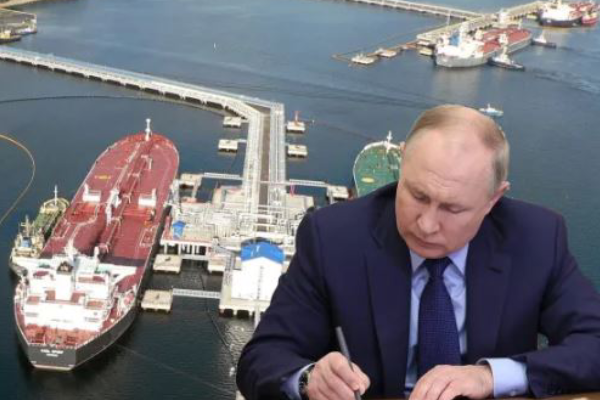President Vladimir Putin issued Russia’s long-awaited reaction to a Western price ceiling , with signing a directive prohibiting the delivery of crude oil and oil products to nations that adhere to the quota beginning February 1, 2023 for five months.
The decree, published on a government portal and the Kremlin website, was presented as a direct response to “actions that are unfriendly and contradictory to international law by the United States and foreign states and international organisations joining them.”
[wonderplugin_video iframe=”https://youtu.be/gAt7nElk-Y0″ lightbox=0 lightboxsize=1 lightboxwidth=960 lightboxheight=540 autoopen=0 autoopendelay=0 autoclose=0 lightboxtitle=”” lightboxgroup=”” lightboxshownavigation=0 showimage=”” lightboxoptions=”” videowidth=600 videoheight=400 keepaspectratio=1 autoplay=0 loop=0 videocss=”position:relative;display:block;background-color:#000;overflow:hidden;max-width:100%;margin:0 auto;” playbutton=”https://www.tvcnews.tv/wp-content/plugins/wonderplugin-video-embed/engine/playvideo-64-64-0.png”]
“Deliveries of Russian oil and oil products to foreign entities and individuals are banned, on the condition that in the contracts for these supplies, the use of a maximum price fixing mechanism is directly or indirectly envisaged,” the decree stated, referring specifically to the United States and other foreign states that have imposed the price cap.
“The established ban applies to all stages of supply up to the end buyer.”
The Group of Seven major nations, the European Union, and Australia decided this month to impose a $60-per-barrel price restriction on Russian seaborne crude oil beginning December 5 in response to Moscow’s “special military operation” in Ukraine.
While the cap is not far below the windfall price, Russia was able to sell its oil for this year, which helped Moscow counter the effects of financial sanctions, it is close to the price at which Russian oil is now traded.
After Saudi Arabia, Russia is the second-largest oil exporter in the world, and a significant decline in its output would have a significant impact on the world’s energy supplies.
The decree, which includes a provision allowing Putin to overturn the prohibition in exceptional circumstances, declared that “this comes into force on February 1, 2023, and applies until July 1, 2023.”
Creating a Wider deficit
The price cap, unseen even in the times of the Cold War between the West and the Soviet Union, is aimed at crippling Russian state coffers and Moscow’s military efforts in Ukraine.
Some analysts have said that the cap will have little immediate impact on the oil revenues that Moscow is currently earning.
However, Finance Minister Anton Siluanov said on Tuesday that Russia’s budget deficit could be wider than the planned 2 percent of GDP in 2023, with the oil price cap squeezing export income, an extra fiscal hurdle for Moscow as it spends heavily on its military campaign in Ukraine.
Russia has been promising to respond officially for weeks, and the eventual decree largely established what officials had already said publicly.














